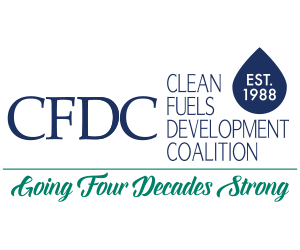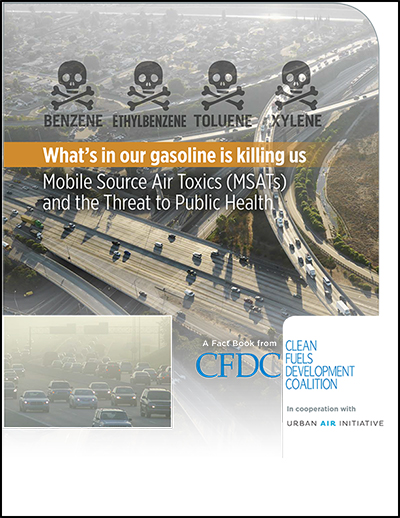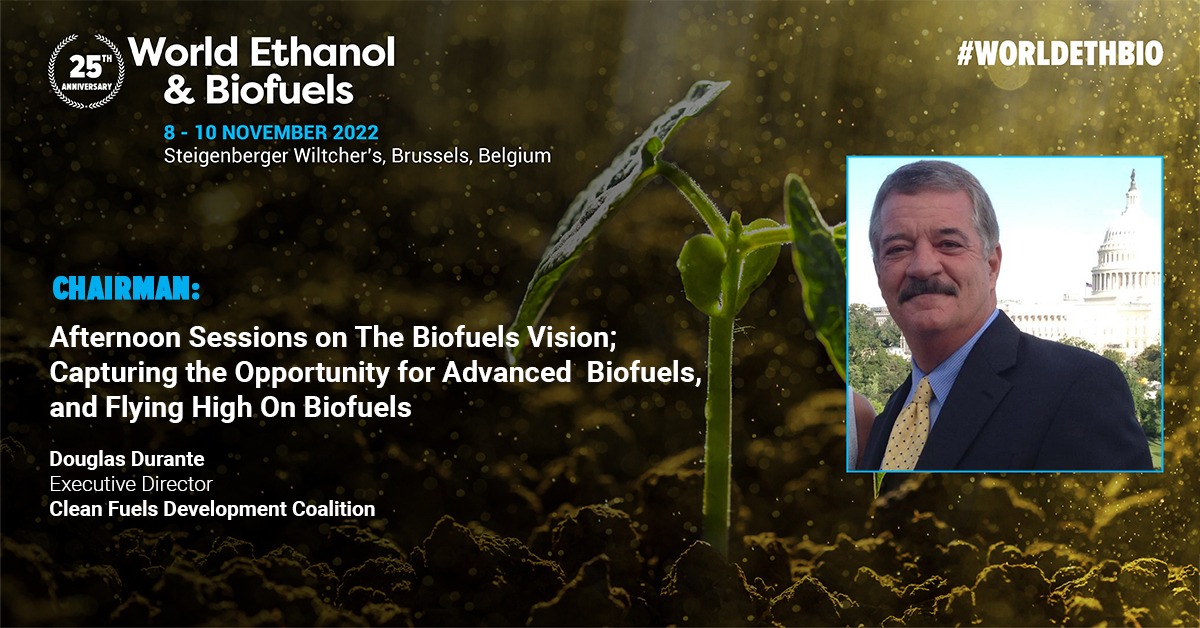MSAT Fact Book
The Mobile Source Air Toxics Fact Book was supported by more than two dozen groups from the ethanol industry and makes a compelling case for replacing carcinogenic octane additives with clean octane ethanol. Find it and related information through CFDC’s Safe Gasoline Campaign.
Experience: The Difference
For 30 years the Clean Fuel Development Coalition (CFDC) has been working with hundreds of diverse private and public organizations to build common ground and effective coalitions that can change status quo to save lives and create jobs. CFDC members and supporters include fuel and chemical producers, automakers, technology developers, agricultural producers, and NGOs interested in economic, energy, environmental, and national security.
CFDC is 501(c) (6) non-profit organization that actively supports the increased production and use of fuels that can reduce air pollution and oil imports. Through six administrations and sixteen Congressional delegations, CFDC has been building bi-partisan support in government to work with industry to foster healthy national economic, energy, environmental, and national security-related policies. Federal legislative and regulatory experience includes support for biofuel programs and incentives, working with Congress on the Energy Policy Act, Clean Air Act Amendments, the Reformulated Gasoline program, the Renewable Fuels Standard, and defending agency budgets for programs that help meet clean fuel and clean air regulations. At the state level, CFDC has helped develop clean fuel programs and industry initiatives that helped build the modern ethanol industry. CFDC works with all interested parties to support clean fuel related legislation and regulations that will drive new technologies that will help our country meet the ever-changing and complex demands of our society.
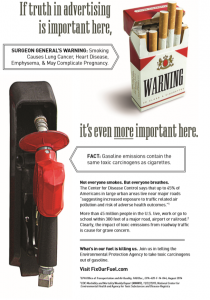
CFDC News & Events
Auto Alliance Underscores the Importance of High Octane Low Carbon Fuels
Washington D.C., June 25, 2021—The Clean Fuels Development Coalition (CFDC) called a recent letter from automakers in support of high octane low carbon fuels further validation that ethanol has a key role to play in protecting public health and increasing the efficiency of current and future vehicles.
In a letter to former Senate Majority Leader Tom Daschle who is the Chairman of the High Octane Low Carbon Alliance (HOLCA) that includes CFDC and several of its members, the Alliance for Automotive Innovation (AAI) said liquid fuels will continue to be widely used well in to the future. AAI is the singular voice for the auto industry representing 38 companies producing 99 percent of the light duty vehicles sold in the Unites States.
The Alliance wrote “Gasoline will continue to play a vital role in transportation for years to come. The use of high octane low carbon liquid fuels would simultaneously support vehicle performance, including fuel economy, and further reduce greenhouse gas emissions. Such benefits would be realized by new and existing internal combustion engines and therefore should be encouraged as additional solutions as soon as possible to maximize environmental benefits across the fleet.”
CFDC Calls ON EPA To Prioritize Octane in New Fuel Economy Rule
The Clean Fuels Development Coalition called the pending revision of the nation’s fuel economy rules one of the most immediate and tangible actions the Biden Administration can take to address a range of issues impacting climate, health, and economic challenges. In a letter congratulating incoming Environmental Protection Agency Administrator Michael Regan, CFDC called for the “Repeal & Replace” of the SAFE rule and cited an Amicus Brief supporting increased octane and toxic controls.
Higher Ethanol Blends
CFDC applauded the recent report by the state of Nebraska on the positive results from the state’s year long test of 30% ethanol blends in non flex fuel vehicles. The objective was “to determine adaptability, economic feasibility, and environmental impact of using E30” and according to Nebraska Governor Pete Ricketts, the final report on the demonstration indicates positive results on all counts.
Reduce Toxics in Gasoline!
CFDC Co-sponsored a forum at the United Nations Foundation recently that featured expert speakers and presentations covering a wide range of health and environmental issues. The National Farmers Union and the Environment and Energy Study Institute (EESI) also sponsored this day long forum. Health and environmental leaders are coming together calling for EPA to reduce toxic compounds in gasoline.
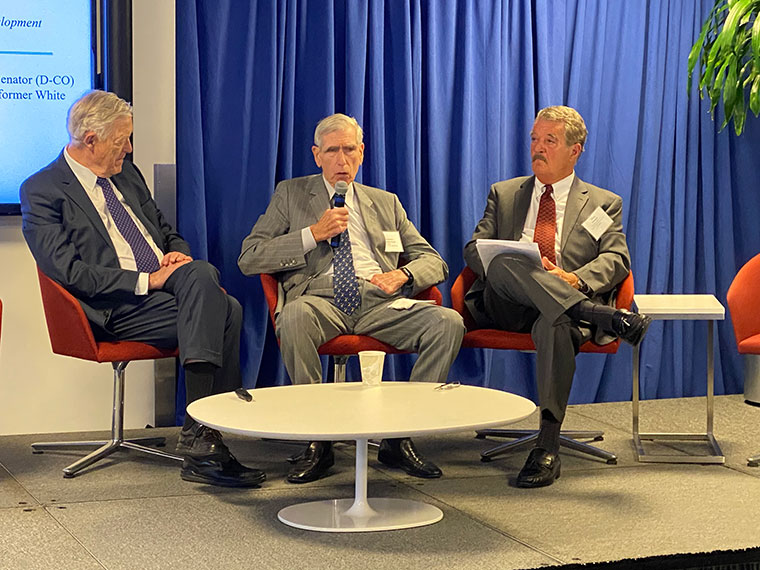
CFDC’s Doug Durante leads a discussion with UN Foundation Chairman and former Colorado Senator Tim Wirth, and C. Boyden Gray, former U.S. Ambassador to the European Union and White House Counsel to President George W. Bush.
Legislation & Regulation
- The primary driver for the advancement of cleaner fuels has been legislation at both the federal and state levels. While the ethanol industry has matured and requires no subsidies, without legislation encouraging and even requiring the use of clean-burning fuels the markets would not have been developed and investment would not have occurred.
- CFDC is an industry thought leader when it comes to shaping legislation that will propel clean fuels to the next level. From meetings with federal lawmakers on Capitol Hill to governors and state legislators across the country, CFDC helps guide public policy to ensure that the decisions are what is best for our country in the long-term. It’s public interest vs. special interest.
- Part of CFDC’s impact on the legislative process is achieved through providing factual and trusted information to the House, Senate, and Executive Branch.
- After Congress passes legislation, it is up to the different regulatory agencies to decide how the laws will be implemented. CFDC takes a very active role in helping the U.S. Environmental Protection Agency, the U.S. Departments of Energy and Agriculture implement the national renewable fuel standard, monitor the federal reformulated gasoline program, enforce the Clean Air Act Amendments, and meet the energy and environmental intents of Congress.
- There are several regulatory issues that are currently being decided with regard to fuel testing, emission modeling, CAFE standards, automotive technology, and octane standards for gasoline, mobile source air toxic emissions, and public health fuel-related research. Without the efforts of the CFDC and similar like-minded groups, there are no guarantees that fuels will continue to be cleaner and domestic energy producers will continue to grow and prosper.
Education
- One of the Coalition’s primary objectives is education. Without an appreciation for the benefits and value of clean fuels to our society, there will not be sufficient support at the Congressional and executive levels to change status quo and implement the new programs necessary to achieve those benefits. CFDC works with its members and other like-minded organization to compile and synthesize information that will stimulate the dialogue between industry, government, NGOs, the public, and the media to open the market and break down barriers to clean fuels. CFDC publishes Fact Books, White Papers, Issues Briefs, and provides Congressional testimony.
- Through CFDC’s foundation, several educational campaigns have been developed such as the FlexFuel & FlexFuel Vehicle Awareness Campaign supporting alternative fuels and vehicles. The Ethanol Across America campaign produced radio shows, focused on regional education campaigns, and articles for the trade press and mainstream media. Considered a thought leader in the area of clean fuels, CFDC is often called upon to provide a broader perspective as it is not a typical single issue trade association.
Outreach
- CFDC and its members have delivered hundreds of speeches to numerous organizations about the benefits of domestic, renewable, and environmentally friendly transportation fuels. CFDC has worked with the U.S. Council of Mayors, the National Conference of State Legislators, National Governors Coalition, Governors’ Biofuels Coalition, and the United Nations Council on Sustainable Development — to name a few. As part of its education and outreach program, CFDC has sponsored, co-sponsored, presented or participated in hundreds of national and international conferences, and special events. Examples include:
- Creating the concept and managing six Environmental Inaugural Balls
- Supporting 100+ international conferences on fuel quality
- Delivering Congressional testimony
- Testifying before the United Nations
- Supporting the Sustainable Energy Caucus and Congressional Renewable Energy Expo
- Participating in the Nation’s 4th of July parade, and countless state and community events that support the development of clean fuels.
- The more information that is available to the public, government officials and lawmakers, the more likely they are to support growth in cleaner-burning fuels. (See CFDC News & Current Events and Publications).
